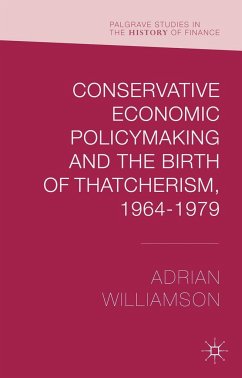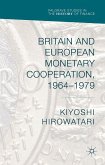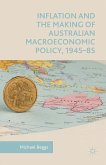Adrian Williamson
Conservative Economic Policymaking and the Birth of Thatcherism, 1964-1979
Adrian Williamson
Conservative Economic Policymaking and the Birth of Thatcherism, 1964-1979
- Gebundenes Buch
- Merkliste
- Auf die Merkliste
- Bewerten Bewerten
- Teilen
- Produkt teilen
- Produkterinnerung
- Produkterinnerung
In this book, Adrian Williamson investigates the processes by which Thatcherism became established in Tory thinking, and questions to what extent the politician herself is responsible for Thatcherism within the Conservative Party.
Andere Kunden interessierten sich auch für
![Britain and European Monetary Cooperation, 1964-1979 Britain and European Monetary Cooperation, 1964-1979]() Kiyoshi HirowatariBritain and European Monetary Cooperation, 1964-197975,99 €
Kiyoshi HirowatariBritain and European Monetary Cooperation, 1964-197975,99 €![Inflation and the Making of Australian Macroeconomic Policy, 1945-85 Inflation and the Making of Australian Macroeconomic Policy, 1945-85]() Michael BeggsInflation and the Making of Australian Macroeconomic Policy, 1945-8575,99 €
Michael BeggsInflation and the Making of Australian Macroeconomic Policy, 1945-8575,99 €![Deepening Neoliberalism, Austerity, and Crisis Deepening Neoliberalism, Austerity, and Crisis]() Julien MercilleDeepening Neoliberalism, Austerity, and Crisis39,99 €
Julien MercilleDeepening Neoliberalism, Austerity, and Crisis39,99 €![Institutions Always 'Mattered' Institutions Always 'Mattered']() O. HavrylyshynInstitutions Always 'Mattered'39,99 €
O. HavrylyshynInstitutions Always 'Mattered'39,99 €![Cyprus and the Financial Crisis Cyprus and the Financial Crisis]() John TheodoreCyprus and the Financial Crisis75,99 €
John TheodoreCyprus and the Financial Crisis75,99 €![Applying the Dismal Science Applying the Dismal Science]() Iain McLeanApplying the Dismal Science75,99 €
Iain McLeanApplying the Dismal Science75,99 €![Businessmen, Clientelism, and Authoritarianism in Egypt Businessmen, Clientelism, and Authoritarianism in Egypt]() Safinaz El TaroutyBusinessmen, Clientelism, and Authoritarianism in Egypt75,99 €
Safinaz El TaroutyBusinessmen, Clientelism, and Authoritarianism in Egypt75,99 €-
-
-
In this book, Adrian Williamson investigates the processes by which Thatcherism became established in Tory thinking, and questions to what extent the politician herself is responsible for Thatcherism within the Conservative Party.
Produktdetails
- Produktdetails
- Palgrave Studies in the History of Finance
- Verlag: Palgrave Macmillan / Springer Palgrave Macmillan
- 2015 edition
- Seitenzahl: 378
- Erscheinungstermin: 17. Februar 2015
- Englisch
- Abmessung: 216mm x 140mm x 22mm
- Gewicht: 610g
- ISBN-13: 9781137460257
- ISBN-10: 1137460253
- Artikelnr.: 42233145
- Herstellerkennzeichnung
- Libri GmbH
- Europaallee 1
- 36244 Bad Hersfeld
- gpsr@libri.de
- Palgrave Studies in the History of Finance
- Verlag: Palgrave Macmillan / Springer Palgrave Macmillan
- 2015 edition
- Seitenzahl: 378
- Erscheinungstermin: 17. Februar 2015
- Englisch
- Abmessung: 216mm x 140mm x 22mm
- Gewicht: 610g
- ISBN-13: 9781137460257
- ISBN-10: 1137460253
- Artikelnr.: 42233145
- Herstellerkennzeichnung
- Libri GmbH
- Europaallee 1
- 36244 Bad Hersfeld
- gpsr@libri.de
Adrian Williamson studied History and Law at Trinity Hall, Cambridge, and was called to the Bar in 1983. He has practised at Keating Chambers since 1989, taking silk in 2002. The papers he has delivered include 'The Conservatives and 'Concerted Action': Economic Policy making 1975-1979' in 2010 and ''Reversing the Trend': Keith Joseph and the remaking of British Conservatism, 1974-1979' in 2011.
Preface And Acknowledgements List Of Tables And Figures List Of Abbreviations About The Author 1. Introduction The Historiographical Context Methodology And Approach The Argument And Structure Of This Book 2. Policymaking: Structures, Ideas And Influences Introduction The Conservative Economic Inheritance Policymaking 1964-1970 How, Who And What? The Powellite Challenge 1970-1974: Crisis In Government How Who And What? Party Dissent Keynesian Loss Of Faith? 1974-9: Conservative Reappraisal Capture By The Think-Thanks? Reconsideration The Battle Of Ideas 3. Tax And Spend: Towards A Smaller State? Introduction Taxation Reform And Pacemakers, 1964-1974 The Outside World: Debating Tax In The 1970s The Conservatives And Tax, 1974-1979 Public Spending Less Is More: 1964 To 1971 1971 To 1974: Pump Priming The 1970s Spending Crisis The Conservatives And Spending, 1974-1979 A New Frontier? Less Welfare? Building Wealth? North Sea Oil To The Rescue? Conclusions 4. From Prices And Incomes PolicyTo Sado-Monetarism? Introduction Planning Prices And Incomes 1964-1971: Tory Indecision Was Final Statutory Restraint: Conservative Policy 1972-1974 Towards Prices And Incomes Policy The Importance Of Money The Debate About Inflation Labour In Power 1974-79: Tory Rethink On Prices And Incomes Policy The Social Contract Conservative Discussions On Prices And Incomes Policy Price And Dividend Control Were The Conservatives Theoretical Monetarists? Conclusions 5. Conservative Industrial Policy: The End Of The Mixed Economy? Introduction Industry And The State Industry, The State And Politics The Industrial Problem And Proposed Solutions Post-War Industrial Policy The Conservatives And The Nationalised Industries Policymaking 1964-1970 The Conservative Government 1970-1974: Confusion Confounded? The Nationalised Industries 1974-1979: The Origins Of Privatisation? The Conservatives And Industrial Decline 1964-1970 Lame Ducks: 1970-1974 Lame Ducks To The Slaughter 1974-1979? A Positive Policy For Industry? 1964-1970 Interventionism And The 1972 Act Policymaking 1974-1979: Trusting The Market And The Wider Debate Conclusions 6.Trade Unions: The Discipline Of Law? Introduction 239 The (Strong) Position Of The Unions Before 1979 The Trade Unions: Strengths And Weaknesses The Intellectual Context Bringing The State In: 1964-1974 Towards The Act: 1964-1971 The 1971 Act Fails: 1971-1974 Rethinking Policy, 1975-1979 Official Policymaking Other Voices Stepping Stones Conclusions 7.Britain's Role In The World Economy Introduction The Conservatives And Europe 1961-75: Getting In 1975-1979: Digging In Sterling, Trade And The Balance Of Payments Phase One: Defending Sterling, 1964-1971 Phase Two: Floating, Sinking And The Aes, 1972-1976 Phase Three: Let The Pound Rise, 1976- Monetarism In One Country? Flows Of Oil And Capital The European Monetary System Flows Of People: Immigration Conclusions 8. Conclusion Concluding Thoughts Further Work The 1950s Revisited The Thatcher Governments 1979-1990 (And To 2015?) What About The Voters? Thatcherism Now Notes Bibliography And Other Sources
Preface And Acknowledgements List Of Tables And Figures List Of Abbreviations About The Author 1. Introduction The Historiographical Context Methodology And Approach The Argument And Structure Of This Book 2. Policymaking: Structures, Ideas And Influences Introduction The Conservative Economic Inheritance Policymaking 1964-1970 How, Who And What? The Powellite Challenge 1970-1974: Crisis In Government How Who And What? Party Dissent Keynesian Loss Of Faith? 1974-9: Conservative Reappraisal Capture By The Think-Thanks? Reconsideration The Battle Of Ideas 3. Tax And Spend: Towards A Smaller State? Introduction Taxation Reform And Pacemakers, 1964-1974 The Outside World: Debating Tax In The 1970s The Conservatives And Tax, 1974-1979 Public Spending Less Is More: 1964 To 1971 1971 To 1974: Pump Priming The 1970s Spending Crisis The Conservatives And Spending, 1974-1979 A New Frontier? Less Welfare? Building Wealth? North Sea Oil To The Rescue? Conclusions 4. From Prices And Incomes PolicyTo Sado-Monetarism? Introduction Planning Prices And Incomes 1964-1971: Tory Indecision Was Final Statutory Restraint: Conservative Policy 1972-1974 Towards Prices And Incomes Policy The Importance Of Money The Debate About Inflation Labour In Power 1974-79: Tory Rethink On Prices And Incomes Policy The Social Contract Conservative Discussions On Prices And Incomes Policy Price And Dividend Control Were The Conservatives Theoretical Monetarists? Conclusions 5. Conservative Industrial Policy: The End Of The Mixed Economy? Introduction Industry And The State Industry, The State And Politics The Industrial Problem And Proposed Solutions Post-War Industrial Policy The Conservatives And The Nationalised Industries Policymaking 1964-1970 The Conservative Government 1970-1974: Confusion Confounded? The Nationalised Industries 1974-1979: The Origins Of Privatisation? The Conservatives And Industrial Decline 1964-1970 Lame Ducks: 1970-1974 Lame Ducks To The Slaughter 1974-1979? A Positive Policy For Industry? 1964-1970 Interventionism And The 1972 Act Policymaking 1974-1979: Trusting The Market And The Wider Debate Conclusions 6.Trade Unions: The Discipline Of Law? Introduction 239 The (Strong) Position Of The Unions Before 1979 The Trade Unions: Strengths And Weaknesses The Intellectual Context Bringing The State In: 1964-1974 Towards The Act: 1964-1971 The 1971 Act Fails: 1971-1974 Rethinking Policy, 1975-1979 Official Policymaking Other Voices Stepping Stones Conclusions 7.Britain's Role In The World Economy Introduction The Conservatives And Europe 1961-75: Getting In 1975-1979: Digging In Sterling, Trade And The Balance Of Payments Phase One: Defending Sterling, 1964-1971 Phase Two: Floating, Sinking And The Aes, 1972-1976 Phase Three: Let The Pound Rise, 1976- Monetarism In One Country? Flows Of Oil And Capital The European Monetary System Flows Of People: Immigration Conclusions 8. Conclusion Concluding Thoughts Further Work The 1950s Revisited The Thatcher Governments 1979-1990 (And To 2015?) What About The Voters? Thatcherism Now Notes Bibliography And Other Sources








